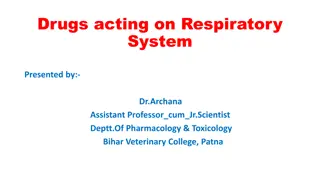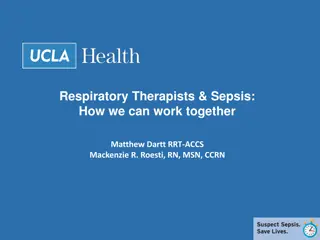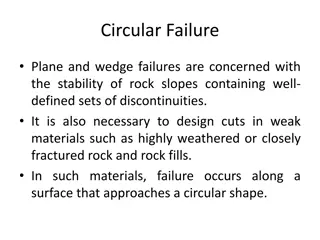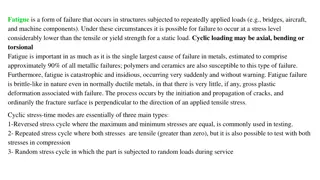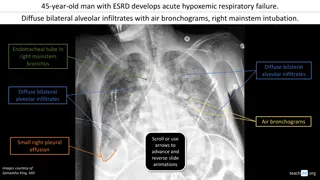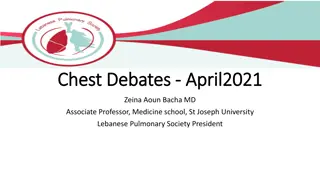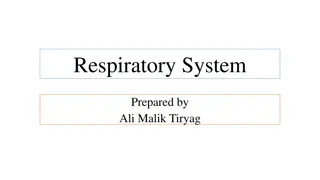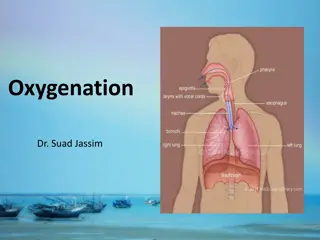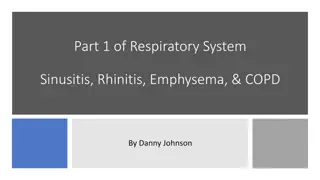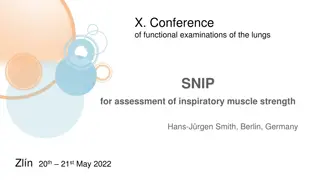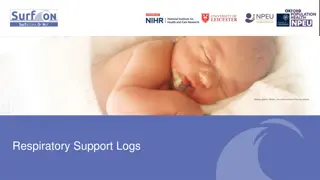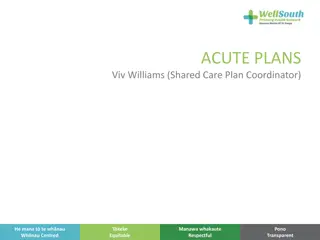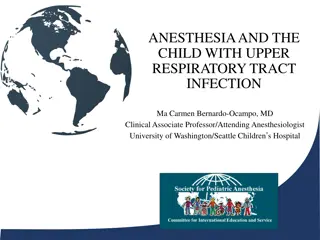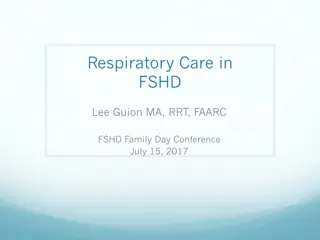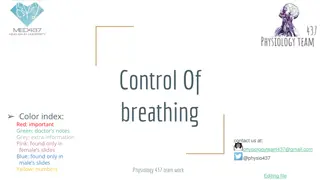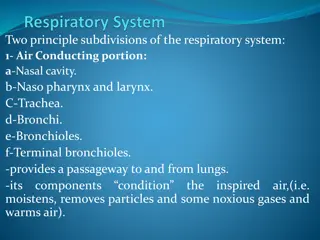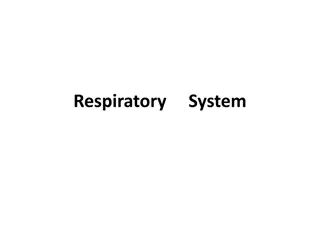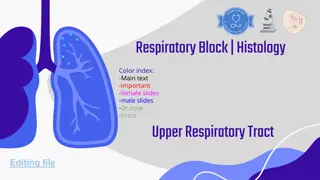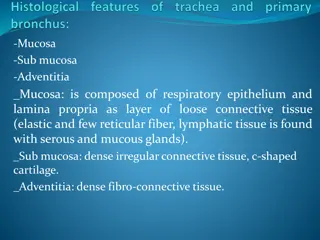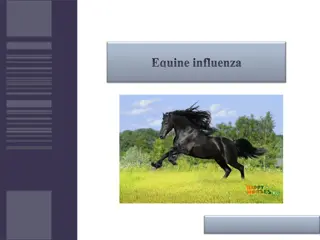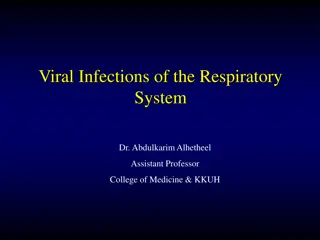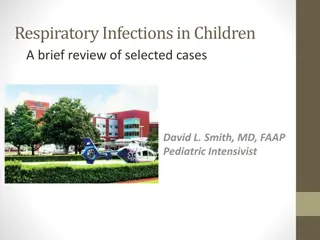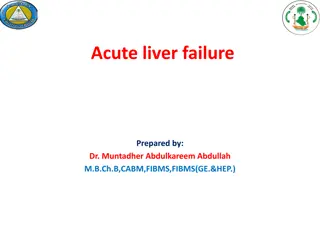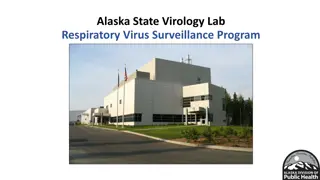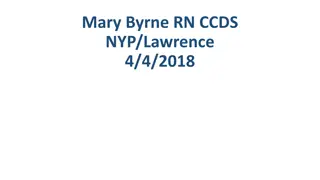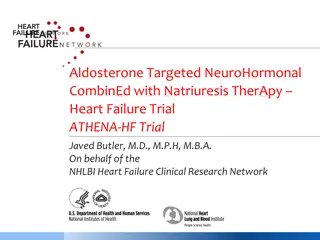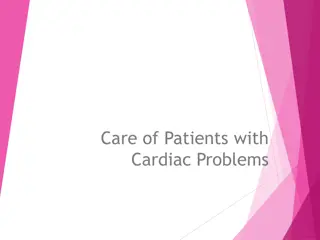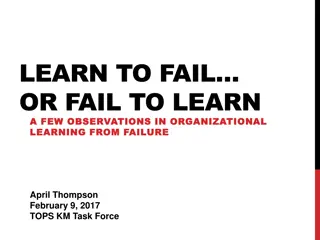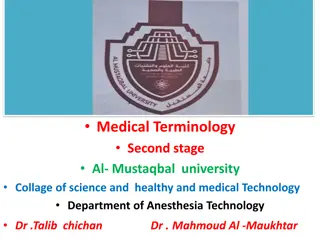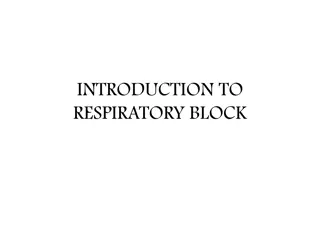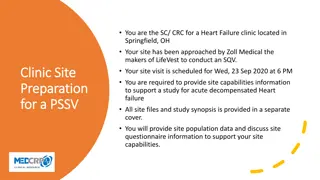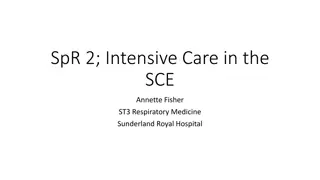Case Conference - ARDS and Hypoxemic Respiratory Failure in 34-Year-Old Male
34-year-old male transferred to MICU for hypoxemic respiratory failure with a history of asthma, recent respiratory symptoms, and suboptimal response to previous antibiotic treatment. Initial labs and imaging findings indicate a complex differential diagnosis involving multiple organ systems. Furthe
3 views • 24 slides
Pragmatic Urinary Sodium-Based Treatment Algorithm in Acute Heart Failure (PUSH-AHF) Trial Overview
The PUSH-AHF trial, conducted at the University Medical Center Groningen, aimed to evaluate the effectiveness and safety of natriuresis-guided diuretic therapy in acute heart failure. The study design was pragmatic, prospective, single-center, open-label, randomized, and controlled. Key outcomes inc
2 views • 20 slides
Understanding Drugs Acting on the Respiratory System for Effective Treatment
Explore the classification and actions of drugs targeting the respiratory system, including antitussives, expectorants, respiratory stimulants, bronchodilators, and mucolytics. Discover how these medications work to suppress coughs, promote fluidity of bronchial secretions, and stimulate respiratory
0 views • 14 slides
Global Nutrition Prevalence Rates in Children and Women
This content highlights the prevalence rates of acute malnutrition, severe acute malnutrition (SAM), moderate acute malnutrition (MAM), childhood stunting, acute malnutrition based on MUAC and edema, and acute malnutrition in pregnant and lactating women. The data is based on various criteria such a
9 views • 37 slides
Collaborating to Combat Sepsis: Role of Respiratory Therapists
Sepsis is a critical condition involving infection and inflammation, where the body's response causes widespread symptoms. Learn about the continuum of sepsis, its pathophysiology, and respiratory warning signs. Respiratory therapists play a crucial role in identifying and managing sepsis, with stat
1 views • 14 slides
Understanding Circular Failure in Rock Slopes: Causes and Design Considerations
Circular failure in rock slopes, such as those containing discontinuities or weak materials like highly weathered or fractured rock, occurs along circular surfaces. This type of failure is common when geological features are not clearly defined. Factors influencing circular failure, conditions under
0 views • 21 slides
Understanding Fatigue Failure in Structural Materials
Fatigue failure is a common form of structural failure caused by repetitive loading, especially in metals but also affecting polymers and ceramics. This type of failure can occur at stress levels much lower than the material's static strength, often leading to sudden and catastrophic breaks without
0 views • 9 slides
Understanding Acute Respiratory Infections (ARI): Symptoms, Classification, and Transmission
Acute Respiratory Infections (ARI), characterized by sudden onset respiratory symptoms affecting the respiratory system from nose to alveoli, are a complex group of diseases caused by various agents. Symptoms include pain in the sinuses, nasal congestion, fatigue, sinusitis, coughing, and more. The
0 views • 16 slides
Rehabilitation Considerations During the COVID-19 Outbreak
Rehabilitation services during the COVID-19 pandemic are crucial for continuing essential care and optimizing outcomes, especially for individuals with severe COVID-19 cases. Considerations for non-COVID-19 rehabilitation services must be maintained to address acute injuries, post-surgical recovery,
0 views • 14 slides
Clinical Validation in Acute Respiratory Failure Case Study
Clinical validation plays a crucial role in ensuring accurate diagnosis and treatment for patients, particularly in cases like acute respiratory failure. This case study highlights the importance of thorough documentation review, collaboration with healthcare team members, and effective validation q
1 views • 29 slides
Acute Respiratory Failure in ESRD Patients with Diffuse Bilateral Alveolar Infiltrates
In a 45-year-old male with end-stage renal disease (ESRD) and acute hypoxemic respiratory failure, diffuse bilateral alveolar infiltrates with air bronchograms were noted, including right mainstem intubation. Correct positioning and management steps for endotracheal tube placement were discussed. Ad
0 views • 4 slides
Respiratory Health Insights and Updates by Dr. Zeina Aoun Bacha, MD
Explore key topics in respiratory health with Dr. Zeina Aoun Bacha, MD, including World Respiratory Diseases Day, Organizing Pneumonia, Sputnik Five Vaccine, and AstraZeneca Vaccine. Stay informed on important respiratory events and vaccination developments.
1 views • 10 slides
Understanding the Respiratory System: An Overview
The respiratory system, consisting of the upper and lower respiratory tracts, is responsible for ventilation and gas exchange. Learn about the anatomy, common symptoms like dyspnea and cough, and how the system functions anatomically and physiologically. Understanding these aspects can help in recog
0 views • 15 slides
Understanding Oxygenation and Respiratory System Function
Explore essential terms like alveoli, perfusion, atelectasis, and more in the context of respiratory system function. Learn about lung anatomy, oxygenation processes, and common respiratory disorders like dyspnea and hypoxia. Discover the crucial factors for maintaining normal respiratory function.
0 views • 35 slides
Understanding Respiratory System Disorders: Sinusitis, Rhinitis, Emphysema, and COPD
This informative content delves into common respiratory issues such as sinusitis, rhinitis, emphysema, and COPD. It provides detailed information on the symptoms, diagnostic criteria, and rating formulas for each condition. The content also touches upon military service-related respiratory problems.
0 views • 15 slides
Understanding Abnormal Liver Function Tests: Acute vs. Chronic Approach
Comprehensive discussion on assessing patients with abnormal liver test results, focusing on distinguishing between acute and chronic liver conditions. Covers diagnostic workup, patient cases, and differential diagnosis, emphasizing the importance of patient history, physical examination, and key di
0 views • 16 slides
Sniff Nasal Inspiratory Pressure (SNIP): Assessing Respiratory Muscle Strength
SNIP is a sensitive non-invasive test that measures inspiratory muscle strength by assessing nasal pressures during a sniff maneuver. It is a valuable tool for early detection of respiratory muscle decline, providing insights into potential threats like hypercapnic respiratory failure, impaired coug
0 views • 11 slides
Neonatal Respiratory Support Study Overview
This study focuses on evaluating the primary outcomes of length of hospital stay post-birth and incidence of severe respiratory failure in infants receiving respiratory support. Detailed logs are maintained daily until the infant is off respiratory support or discharged. The study is funded by NIHR.
0 views • 19 slides
Comprehensive Guide to Creating and Understanding Acute Care Plans
This comprehensive guide provides detailed information on creating and understanding acute care plans, including the purpose of an acute plan, who needs one, what information can be written in an acute plan, examples of baseline clinical parameters, alerts to more detailed plans, and insights into c
0 views • 17 slides
Anesthesia and Upper Respiratory Tract Infections in Children
This presentation discusses the etiology, differential diagnoses, and management of upper respiratory tract infections (URIs) in children undergoing anesthesia. It covers causes of bronchoconstriction, adverse respiratory effects of URIs, and current anesthetic recommendations. The content emphasize
0 views • 52 slides
Respiratory Care in FSHD: Guidelines and Management Overview
Comprehensive overview of respiratory care in Facioscapulohumeral Muscular Dystrophy (FSHD) based on the American Academy of Neurology guidelines. Covers incidence of respiratory insufficiency, assessment of lung function, treatment options including noninvasive ventilation, and strategies for maint
0 views • 16 slides
Understanding the Control of Breathing and Respiratory Rhythm
The content delves into the intricacies of the control of breathing, emphasizing the role of the medulla oblongata in regulating respiratory activity. It explores factors modifying breathing patterns, respiratory consequences of changing PO2, PCO2, and pH, and the functions of central and peripheral
0 views • 16 slides
Epidemiology of Hepatitis B and C in Florida: 2019 Data Analysis
The Department of Health in Florida has released the 2019 data on the epidemiology of Hepatitis B and C as of January 21, 2021. The report includes information on acute and chronic cases, technical notes on case definitions, and changes in national case definitions in 2020. Acute cases require speci
0 views • 35 slides
Understanding the Respiratory System Components and Functions
The respiratory system consists of two primary subdivisions: the Air Conducting portion and the Respiratory portion. The Air Conducting portion includes nasal cavity, naso-pharynx, larynx, trachea, bronchi, bronchioles, and terminal bronchioles, providing a pathway to and from the lungs while condit
0 views • 12 slides
Overview of Respiratory System Components and Functions
The respiratory system consists of vital components like pulmonary compliance and surfactant, crucial for proper lung function. Pulmonary compliance reflects the lung's ease of expansion, influenced by factors like lung elasticity and surface tension. Surfactant, produced by type II alveolar cells,
0 views • 15 slides
Understanding Nasal Cavity Histology and Respiratory Structures
The detailed information provided covers the histological structures of the nasal cavity, including the vestibule, respiratory mucosa, nasal septum, olfactory mucosa, and paranasal sinuses. It also delves into the microscopic structures of the wall of the trachea and primary bronchi. The respiratory
0 views • 11 slides
Respiratory Tract Anatomy Overview
The respiratory tract anatomy includes various structures like mucosa, submucosa, and adventitia in the trachea, bronchi, bronchioles, and terminal bronchioles. Each component has specific compositions and functions, ranging from respiratory epithelium to smooth muscle layers. The images provide a v
0 views • 15 slides
Understanding Equine Influenza: An Overview of Respiratory Tract Infections in Horses
Equine influenza is a contagious upper respiratory infection in horses caused by influenza viruses. This article covers the anatomy of the equine respiratory tract, signs, diagnosis, treatment, prevention, and prognosis of equine influenza. It also discusses the histological structure of the respira
0 views • 18 slides
Understanding Viral Infections of the Respiratory System
Respiratory viral infections are common and primarily caused by viruses, leading to morbidity and time off work. They can range from mild upper respiratory tract infections to severe lower respiratory tract infections like pneumonia. Various viruses like influenza, parainfluenza, respiratory syncyti
0 views • 23 slides
Pediatric Respiratory Infections: An Overview of Cases and Physiology
This review delves into selected cases of respiratory infections in children presented by Dr. David L. Smith, focusing on the anatomical and physiological aspects of the pediatric airway and respiratory system. It discusses respiratory failure in infants and small children, metabolic demands, cyanos
0 views • 49 slides
Overview of Acute Liver Failure: Causes, Classification, and Diagnosis
Acute liver failure is a severe condition characterized by rapid liver dysfunction within 6 months of symptom onset, leading to encephalopathy, coagulopathy, and jaundice. This condition can be classified as hyperacute, acute, subacute, fulminant, or sub-fulminant based on the duration from jaundice
0 views • 16 slides
Alaska State Virology Lab Respiratory Virus Surveillance Program
The Alaska State Virology Lab's Respiratory Virus Surveillance Program accepts specimens from across Alaska, ranging from large hospitals to single physician clinics. They collect specimens representing CLI/ILI weekly and are interested in Severe Acute Respiratory Illness samples, among others. The
1 views • 6 slides
Understanding Postoperative Shock and Respiratory Failure
Postoperative shock refers to different types of shock that may occur after surgery, such as hypovolemic, cardiogenic, or septic shock. It is crucial to recognize the signs and symptoms of shock early to prevent irreversible consequences. On the other hand, respiratory failure can be acute or chroni
0 views • 8 slides
Study on High-Dose Spironolactone in Acute Heart Failure Patients
The ATHENA-HF trial investigates the impact of high-dose spironolactone on reducing NT-proBNP levels in acute heart failure patients. Key objectives include assessing congestion, dyspnea relief, urine output, weight change, diuretic requirement, and outcomes like mortality and readmissions up to 60
0 views • 20 slides
Understanding Cardiac Problems and Heart Failure
This educational content covers essential information on caring for patients with cardiac problems, including blood flow through the heart, causes and types of heart failure, such as left-sided and right-sided heart failure, as well as high-output failure. It also discusses the classification and st
0 views • 24 slides
Observations in Organizational Learning from Failure
Explore the importance of learning from failure in organizational settings through initiatives such as failure forums, peer-assisted problem-solving sessions, and reframing failure as a stepping stone to success. Encouraging open discussion of failure, sharing experiences externally, and promoting a
1 views • 6 slides
Understanding Respiratory System Terminology and Disorders
Explore the terminology and components of the respiratory system including the upper and lower respiratory tract, respiration process, word roots, and common respiratory disorders. Learn the meanings of terms like apnoea, dyspnoea, pneumonia, and more. Enhance your knowledge of respiratory health an
0 views • 12 slides
Comprehensive Overview of Respiratory Block for Medical Students
This respiratory block introduces students to the anatomy, histology, muscles involved in respiration, embryology, radiological anatomy, and management of respiratory disorders. It covers topics like the nasal cavity, pharynx, larynx, trachea, bronchi, lungs, pleura, bronchial tree, and mediastinum.
0 views • 23 slides
Heart Failure Clinic in Springfield, OH - Site Visit for LifeVest Study
Heart Failure clinic in Springfield, OH has been approached by Zoll Medical to conduct a study on acute decompensated heart failure. The clinic's capabilities, staff, and procedures for patient recruitment during COVID-19 are discussed. The study focuses on patients with systolic or diastolic heart
0 views • 14 slides
Management of Acute Respiratory Distress Syndrome: Case Study and Diagnostics
A 54-year-old woman post-laparotomy presents with respiratory distress and bilateral infiltrates on CXR. The case raises suspicion for Acute Respiratory Distress Syndrome (ARDS). Diagnostic criteria and potential investigations, such as CT pulmonary angiogram, thoracic USS, echocardiogram, bronchosc
0 views • 17 slides


